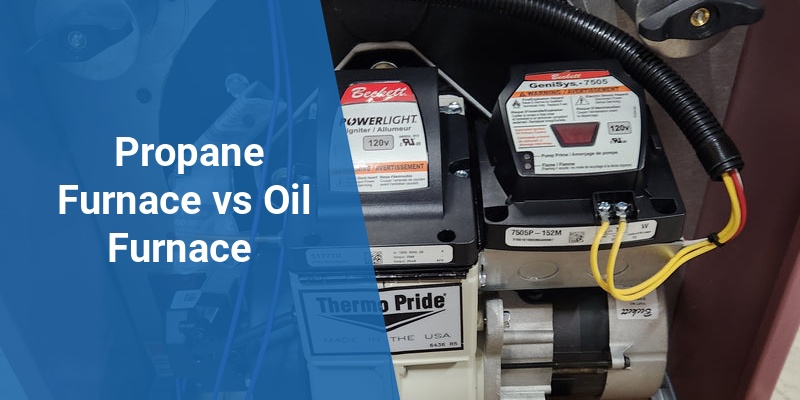Choosing the right heating system is essential for comfort and cost-efficiency in American homes. Propane furnaces and oil furnaces are two popular options, each with distinct benefits and drawbacks. Understanding their differences in fuel type, efficiency, installation costs, maintenance, and environmental impact can help homeowners make informed decisions. The following table summarizes the key factors compared in this article.
| Factor | Propane Furnace | Oil Furnace |
|---|---|---|
| Fuel Source | Liquid propane gas | Heating oil |
| Efficiency | Up to 98% AFUE | Typically 80-87% AFUE |
| Fuel Cost | Generally higher but price stable | Usually lower but price volatile |
| Environmental Impact | Cleaner burning, fewer emissions | Higher emissions, more pollutants |
| Maintenance | Less frequent, simpler system | More frequent, complex oil system |
| Installation | Moderate cost, smaller storage tank | Higher cost, large oil tank requirement |
Fuel Types and Availability
The core difference between propane furnaces and oil furnaces is their fuel source. Propane is a clean-burning liquefied petroleum gas stored in pressurized tanks. It’s widely available, especially in rural or off-grid American homes where natural gas is inaccessible.
Oil furnaces use heating oil, a petroleum product delivered by truck and stored in large, often outdoor tanks. Oil is less common in urban areas but still prevalent in colder regions, particularly in Northeastern states. Fuel availability often determines the feasibility of each furnace type in different parts of the U.S.
Efficiency and Heating Performance
Energy efficiency is critical for reducing heating costs and environmental impact. Propane furnaces boast advanced combustion technology with AFUE ratings up to 98% (Annual Fuel Utilization Efficiency), meaning nearly all fuel converts to heat.
Oil furnaces typically deliver between 80% and 87% AFUE. Older oil furnaces can be even less efficient. Propane burns cleaner and more completely, generating less soot and residue that can impair system operation.
Impact on Heating Costs
Despite propane’s higher efficiency, fuel cost fluctuations significantly influence overall expenses. Oil prices can be volatile, impacted by global crude oil markets, but oil typically costs less per unit than propane. Propane prices remain steadier but generally higher.
Homeowners should weigh fuel efficiency against fuel prices to evaluate long-term heating costs. Propane’s superior efficiency may offset its higher price, especially in well-insulated homes.
Call 888-906-9139 for Free Local HVAC Quotes – No Obligation, Just Savings!
Installation and Equipment Considerations
Installation involves furnace equipment and fuel storage. Propane furnaces require a smaller tank usually placed above or below ground, giving flexibility in installation. The equipment is compact and integrates well with modern HVAC systems.
Oil furnaces need a large storage tank that can require considerable space and must comply with local regulations. Oil systems typically include additional components such as oil lines and pumps, adding complexity and cost to installation and upkeep.
Maintenance and Reliability
Oil furnaces demand more regular maintenance including annual cleanings to remove soot buildup and to maintain burner efficiency. Neglect can cause system failures and reduced lifespan.
Propane furnaces require less frequent maintenance, largely because of their clean combustion properties. Regular inspections and filter replacements suffice. Propane systems tend to be more reliable over time with fewer breakdowns.
Environmental Impact and Safety
From an environmental perspective, propane is the cleaner fuel choice. It produces fewer carbon emissions and pollutants like sulfur dioxide and particulate matter compared to oil. This makes propane a greener option for eco-conscious homeowners.
In terms of safety, propane is stored under pressure and can pose explosion risks if improperly handled, but modern tanks and detectors mitigate this. Oil is less volatile but can cause environmental contamination if leaks occur.
Choosing Between Propane and Oil Furnaces
The decision depends on several factors including:
Call 888-906-9139 for Free Local HVAC Quotes – No Obligation, Just Savings!
- Local fuel availability and delivery options
- Initial installation budget and furnace size requirements
- Long-term fuel price predictions and consumption patterns
- Desired system efficiency and environmental goals
For homeowners in rural or off-grid locations prioritizing efficiency and clean operation, propane furnaces often represent the best balance. Those in traditional oil service areas with enough space for tanks might favor oil furnaces due to fuel cost advantages.
